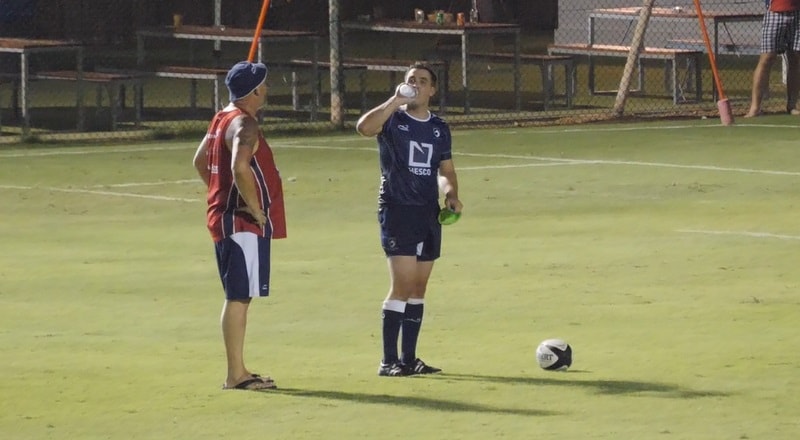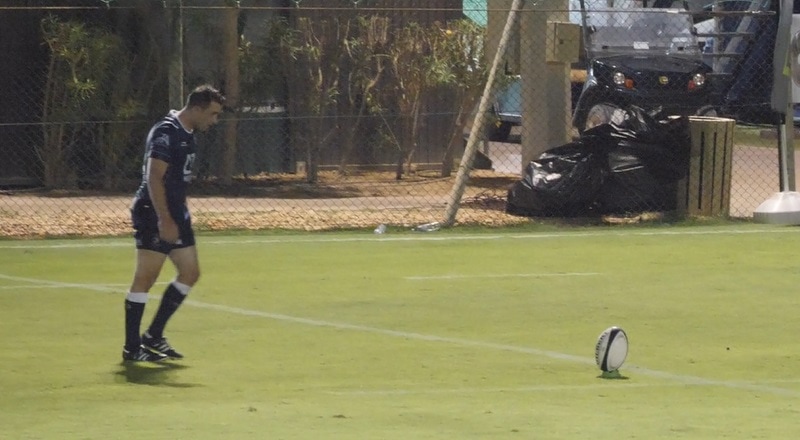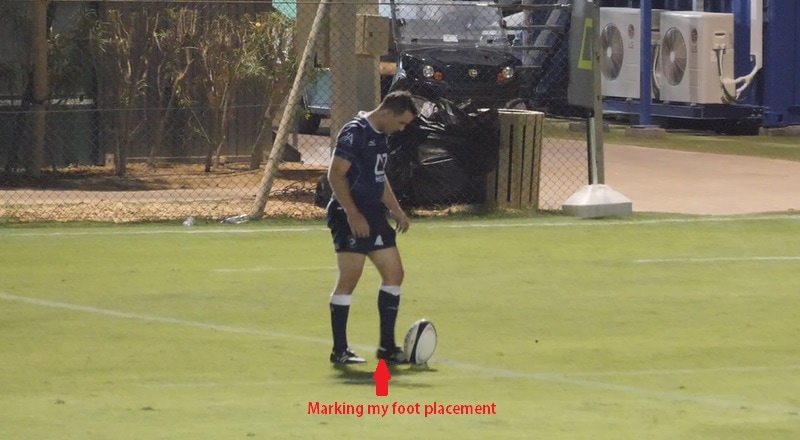Goal Kicking Mindset – from Good to Great
- Nick McCashin
- Kicking, ProRugby Club
Rugby goal kickers are often the first to be picked in the team. Securing vital points for your team is crucial at any level. It can be the difference between winning and losing. Goal kicking mindset is vital for top performing rugby players. A lot of people have asked us…
What is the difference between a good goal kicker and a great goal kicker?
The simple answer is a great kicker is a rugby player who can consistently deliver points for the team across a long period of time.
Rugby Goal Kicking Mindset Challenges
Kickers often punish themselves when they are unsuccessful. Our teammates give us shit. Our opposition gives us shit. The crowd gives us shit. Our teammates tag us in goal kicking blogs because they think they are funny. We wrestle with negative self-talk and try to overcome this with positive self-talk.
Sometimes we speed up or slow down our technique thinking there is the problem with speed. We kick countless successful goals during practice yet we can struggle to convert on the pitch. Rugby goal kickers have to overcome the fear of failure. We have to battle to control our breath. We battle to settle our nerves after we have just been thumped in a tackle.
The wind and weather can be an issue. The opposite team charging us can put those less trained off. (See more on effortless rugby goal kicking here)
Myths about kicking goals
- That you need to be a back to be the goal kicker. There have been many successful forwards who have goal kicked for example John Eales.
- There is only one way to be a great goal kicker
- It is easy. If it were easy everyone would be able to do it.
- Those that give you advice are always right. (Often those that give you advice know fuck all about goal kicking under pressure)
- You must use the traffic light technique or other techniques in this post.
Common Mistakes of a Rugby Goal Kicker
- Putting too much pressure on yourself
- Not mastering technique first
- Looking up before you have kicked
- Letting outside noises or distractions affect your kicking
- Not being focused on the kick
- Not having a system or routine
- Listening to team mates, coaches or family who know fuck all
Rugby Goal Kicking Curses
We have all had one of those days. When we cannot kick to save ourselves. We are not striking them quiet right. We shave the upright or just kept missing to the left. It’s an important game and we really want to do well so we add extra pressure on ourselves when there is no need to. We apply far too much pressure to our kicking before we even stepped on the field.
Goal Kicking that goes wrong & what that looks like
We miss from in front of the posts. We miss the easy ones at the side of the posts. The ball falls off the tee. We feel rushed because we have not been given the tee with enough time. Sorry but this happens a lot to goal kickers. If anyone is responsible for delivering the tee to a goal kicker here is some advice. Watch the game and when there is a try scored or a signal from the referee to get the tee on get your shit together and give your kicker the best chance to score more points! When it goes wrong we get charged down and we hit the posts repeatedly. We slip over when we are about to kick.
Developing the right mindset as a goal kicker
We master the skill in practice. So how can we grow into the best goal kicker in the world? Mindset.
After we have mastered our goal kicking technique and the simple skill, the next step is to develop the right kicking mindset.
What do the ProRugby Goal Kickers do?
There are lots of techniques to help with mindset. It is something all goal kickers work on throughout their careers. The easiest one to implement is take the time. You have long enough to take a few deep breaths to compose yourself before settling into your routine. Leigh Halfpenny imagines the ball is tied to a piece of string and then the other end is tied to an imagined poll in the middle of the posts. He visualizes the ball traveling on this path through the posts hitting the poll.
Owen Farrell picks a small target through and past the posts. Then draws a line from the ball to that target with his eyes. Some kickers imagine other objects through the post. They attempt to hit that object or a small part of that object. In the words of Mel Gibson in the movie the Patriot “Aim small, miss small”.
Here are some of the things that might help.
1. Take your time and compose yourself with a sip of water. Simple yet effective.

2. Make sure the ball is set up correctly and lined up the way you want. Take some more time.

3. Mark your foot placement for your plant foot on the ground.

How did I overcome the fear and develop your rugby goal kicking mindset?
We overcome our fear by practice. Staying positive when is comes to your own goal kicking is key. We overcome any fear by developing strategies to cope with fear. When I say we overcome fear here is the catch. The fear never really disappears we just learn to control our body and the skill we have learnt under the pressure. Here are some of our favorite techniques to help overcome this fear.
The Black Spot Technique
This technique can be credited to a very knowledgeable Rugby man David Mays. If you tilt the ball forward on the tee the sweet spot is around 1/3 of the way up the ball from the ground or tee. Draw a big circle on the ball with a black marker pen right where the sweet spot. This becomes your focus point. Everything outside of the spot if irrelevant. Everything said, heard or happening outside of the black spot is irrelevant.
Ii becomes a focus point to keep a clear mind. To keep you present within yourself and the kick. After your set up and visualization, we repeat the words black spot, black spot, black spot. As we approach the ball we close off any outside noise and zero in on the task of kicking.
The Traffic Light Technique
To help separate each kick into their own single skill tasks we can use what is called the traffic light technique. If we master the fundamentals we often know the three key skills that will make us successful. For example, having a square planted foot aiming at the posts. Connecting with the black spot and following through after the kick.
After each kick, we evaluate how we did each task by imagining a set of traffic lights. We evaluate each part. Green for great, Yellow not quiet our best or Red = fundamental mistake that needs correcting. The aim is to always to get Green, Green, Green. Separating each goal kick into individual tasks when can move on to other tasks during the game.
Have a positive Daily affirmation
Having daily affirmations can help with your goal kicking mindset. Reading them to yourself in the morning and evening will have the brain start to believe the words as you visualise goal kicking success. Each will be specific to you but below are a few examples.
For example writing down:
- Rugby goal kicking is easy. I notice the challenge others face and I overcome this because I have practiced and I am rewarded with a successful goal kick.
- Nick McCashin (or enter your name) has absolute certainty in his ability as a goal kicker. He has no problem achieving 80% or higher in each game or during practice.
- I release all doubt, fears and negative beliefs about goal kicking. I feel at ease, clear headed and powerful.
If you enjoyed or got some value from this post please comment below and tell me how it helped.
For more information from a goal kicking fly half see my interview with Mike Delany.


